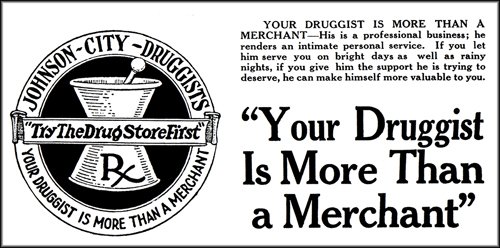A Monday, July 27, 1925 Johnson City Press-Chronicle contained a unique full-page advertisement that caught my attention. The main title said, “Try The Drug Store First.” The premise of the ad was to get patrons to subscribe to the idea that a drug store sold much more than drugs, a concept that carries well over to today.

Downtown Johnson City had its share of pharmaceutical dispensaries. In addition, most of them had fountain service where the customer could sit down at a counter or some small booths. I recall numerous such establishments from the late 1940s thought the 1950s. People were not for lack of choices of druggists within a short distance of the downtown business district.
One of the most popular was Liggetts (257 E. Main at Roan). This two-story brick building was known as the King Building with “King” and “1907” visibly engraved across the top of it. Farther west down the block was Cole Rexall Drug Store (233 E. Main), later becoming Revco. Opposite this business on the south side of the street was Peoples Drug (216 E. Main). Going west from Peoples Drug was Jones Vance Drug (Main and Spring). Diagonally across from it on Fountain Square was Anderson's Drug (201 E. Main, advertised as “The Convenient Corner”).
Just around the corner from Jones Vance was Snyder Jones Drug (100 Main). Traveling west on Market across the railroad tracks was Market Street Drug (134 W. Market, “Your Rexall Store”). Further down the block was Chambers Williams Drug (200 W. Market at Boone). Continuing west several blocks brought you to Wilson Pharmacy (273 W. Market at Watauga). Motoring up Roan Street past Junior High on the right revealed Hospital Pharmacy (602 N. Roan).
One of the last holdout survivors in the downtown area after the business district fell on hard times was Liggett's, but it too eventually closed its doors. Wilson Pharmacy successfully moved to Walnut Street and Revco relocated to North Johnson City.
Each firm had its specialty. My favorite spot in Liggetts was the candy counter just inside the store to the left. Cole had really good hamburgers with the option of adding slaw to them. They also made good malts and delicious milk shakes. I vividly recall a smiling Guy Wilson and a large comic rack at Wilson Drug.
There is a story from my family that proved the essentiality of these early establishments. It involved a good deed performed by my great uncle, Elbert Bowman, in the late 1920s as recalled by one of his sons, Weldon. My uncle, Stanley Carroll, a young boy living along Gray Station Road in Gray Station, once contacted a bad case of the flu that rendered him very sick and weak physically.
Late one evening, Dr. McCollum, a well-known local country doctor, was called to the Bowman home to examine the lad. After finishing his examination, the doctor pushed back from the bed where the sick boy lay and just sat there in deep thought. He then proceeded to write a prescription, handed it to Elbert and told him to get Stan some much-needed medicine as soon as possible.
The nearest drug store was in Johnson City so Elbert and Weldon got in the family’s Model A Ford and drove to the nearby town. When they got there, it was approaching midnight. In spite of the late hour, they were able to locate a pharmacist, get him to open his store, obtain the medicine and expeditiously return to Gray Station and a sick little boy. According to Weldon, Stanley “snapped right out of it,” thanks to Elbert Bowman and an unknown Johnson City pharmacist of yesteryear.
